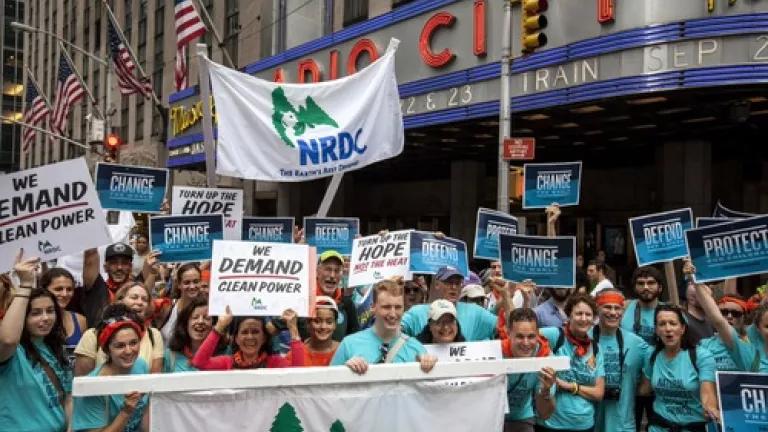
Something extraordinary happened at the United Nations Climate Summit on Tuesday. One world leader after another took to the podium and described what his or her nation is already doing to reduce climate change pollution. Many also announced new measures and committed to future steps. After years of delay, the pace of climate action is picking up.
“The alarm bells keep ringing,” President Obama said in his speech to the General Assembly. “Our citizens keep marching; we cannot pretend we can’t hear them.”
This week confirmed that our voices are being heard. The past three days alone have shown that climate action is growing at every level of society.
NRDC staff and members at the People's Climate March on Sunday.
On Sunday, I marched alongside 400,000 concerned citizens in the People’s Climate March, including many who have supported solar projects, bike-share programs and other climate solutions in their local communities as well as supported national action.
On Monday, I joined with Desmond Tutu and representatives of the Rockefeller Brothers Fund, Generation Capital, and the World Council of Churches to urge major institutions to divest from fossil fuel companies. “The destruction of the earth environment is the human rights challenge of our time,” Tutu said in a prepared video. He called for the end of “the fossil fuels era.”
Corporations are also moving forward with climate solutions, some supporting a price on carbon pollution and others reducing their own emissions. Apple CEO Tim Cook said on Monday, “the time for inaction has passed.” From Apple to PepsiCo to Intel to Nike, companies are recognizing that paralysis in the face of climate change is bad for business.
Many mayors are acting too. As part of the Climate Summit, LA Mayor Eric Garcetti, Philadelphia Mayor Michael Nutter, and Houston Mayor Annise Parker announced the Mayors National Climate Action Agenda to help cities set firm goals for reducing carbon emissions.
And on Tuesday, I went to the United Nations and heard President Obama make it clear the U.S. is serious about fighting climate change. He explained how his administration issued new fuel economy standards that will cut carbon pollution from new cars in half and save drivers $80 billion a year at the pump by 2025. And this June, the administration proposed the first-ever national limits on carbon pollution from power plants—the single largest source of US emissions.
Action at home is helping the U.S. lead abroad. The president vowed to help nations become more resilient in the face of climate change and speed their embrace of clean energy. He singled out the U.S. and China, who as the world’s largest emitters have the greatest obligation to lead. But he emphasized that every nation must act for “no nation is immune,” and “nobody gets a pass.”
The scale of climate change is so vast that we must tackle it everywhere at once—in our neighborhoods, companies, cities, and countries around the world. And we must do it now.
In his speech, President Obama said, “We cannot condemn our children and their children to a future that is beyond their capacity to repair—not when we have the means, the technological innovation and the scientific imagination to begin the work of repairing now. I believe in the words of Dr King that there is such a thing as being too late.”
Joining 400,000 people calling for climate action on Sunday, I felt renewed hope. If concerned citizens and local and national leaders continue to raise our voices, we can respond to the climate threat just in time.
